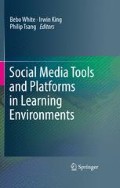Abstract
Recent years have seen a much greater emphasis on learning to learn, be it in a classroom environment or an organization. This focus imparts lifelong learning capabilities inducing a formative learning experience. Several studies have reflected that individual learning, which has been a core component around which the education system has been institutionalized, does not fully enable learners to learn the process of learning. It has been observed that people learn faster and in much greater depth in groups, making them familiar with the process of learning. Collective learning is a term that is often used to refer to this concept of learning in groups (dyads, teams, organizations, communities, and societies). However, collective learning encounters several challenges in terms of planning, structuring, managing, and evaluating. With the advent of social media technologies including: blogs, wikis, twitter, social networking sites, social news, social bookmarking, media sharing, virtual worlds, and more, encouraging distributed, collaborative, dynamic, ubiquitous, and personalized experience; new paradigms for communication, learning, and education have emerged. In this chapter, the focus is on social media technology as an enabler for collective learning in a teaching/learning environment. It illustrates a model that leverages the integrated use of social media technologies to support collective learning in a university teaching/learning environment. Moreover, the model is generalizable to other environments. The model demonstrates how various challenges encountered in collective learning (planning, structuring, managing, and evaluating) can be addressed with the help of social media technologies. A case study is presented to showcase the model’s applicability, feasibility, utility, and success.
This work is supported in part by grants from the US Office of Naval Research.
Access this chapter
Tax calculation will be finalised at checkout
Purchases are for personal use only
Notes
- 1.
- 2.
- 3.
- 4.
- 5.
- 6.
- 7.
- 8.
The course blog is located at: http://socialcomputing.trojanifsc.net/blog/
- 9.
The course wiki is located at: http://socialcomputing.trojanifsc.net/wiki/wikka.php?wakka=HomePage
References
Agarwal, N.: Social Computing in Blogosphere: Challenges, Methodologies, and Opportunities. LAP Lambert Academic Publishing AG & Co. KG (2010)
Agarwal, N., Liu, H.: Modeling and data mining in blogosphere. Synthesis lectures on data mining and knowledge discovery. Morgan & Claypool Publishers (2009)
Agarwal, N., Galan, M., Liu, H., Subramanya, S.: Wiscoll: collective wisdom based blog clustering. J. Inf. Sci. 180(1), 39–61 (2010)
Bonwell, C., Eison, J.: Active Learning: Creating Excitement in the Classroom, volume AEHE-ERIC Higher Education Report No.1. Jossey-Bass, Washington, DC (1991)
Boyd, D.: Why youth (heart) social network sites: the role of networked publics in teenage social life. In: John, D., Catherine, T. (eds.) MacArthur Foundation Series on Digital Media and Learning, pp. 119–142. MIT Press, Cambridge (2007)
Finlayson, A., Cameron, D., Hardy, M.: Journalism Education as a Perpetual Beta Test: Notes on the Design and Delivery of Tertiary ‘Social Media’ Subjects (2009)
Kolb, D.A.: Experimental Learning. Experience as a Source of Learning and Development. Prentice Hall, Upper Saddle River (1984)
Landemore, H., Elster, C.M.: Democratic reason: the mechanisms of collective intelligence in politics. In: Collective Wisdom: Principles and Mechanisms Conference, pp. 22–23. Collége de France, Paris (2008)
Surowiecki, J.: The Wisdom of Crowds: Why the Many are Smarter than the Few and How Collective Wisdom Shapes Business, Economies, Societies, and Nations. Doubleday, Random House, Inc, New York (2004)
Szuba, T.M.: Computational Collective Intelligence. Wiley, New York (2001)
Author information
Authors and Affiliations
Corresponding author
Editor information
Editors and Affiliations
Rights and permissions
Copyright information
© 2011 Springer-Verlag Berlin Heidelberg
About this chapter
Cite this chapter
Agarwal, N. (2011). Collective Learning: An Integrated Use of Social Media in Learning Environment. In: White, B., King, I., Tsang, P. (eds) Social Media Tools and Platforms in Learning Environments. Springer, Berlin, Heidelberg. https://doi.org/10.1007/978-3-642-20392-3_3
Download citation
DOI: https://doi.org/10.1007/978-3-642-20392-3_3
Published:
Publisher Name: Springer, Berlin, Heidelberg
Print ISBN: 978-3-642-20391-6
Online ISBN: 978-3-642-20392-3
eBook Packages: Computer ScienceComputer Science (R0)

